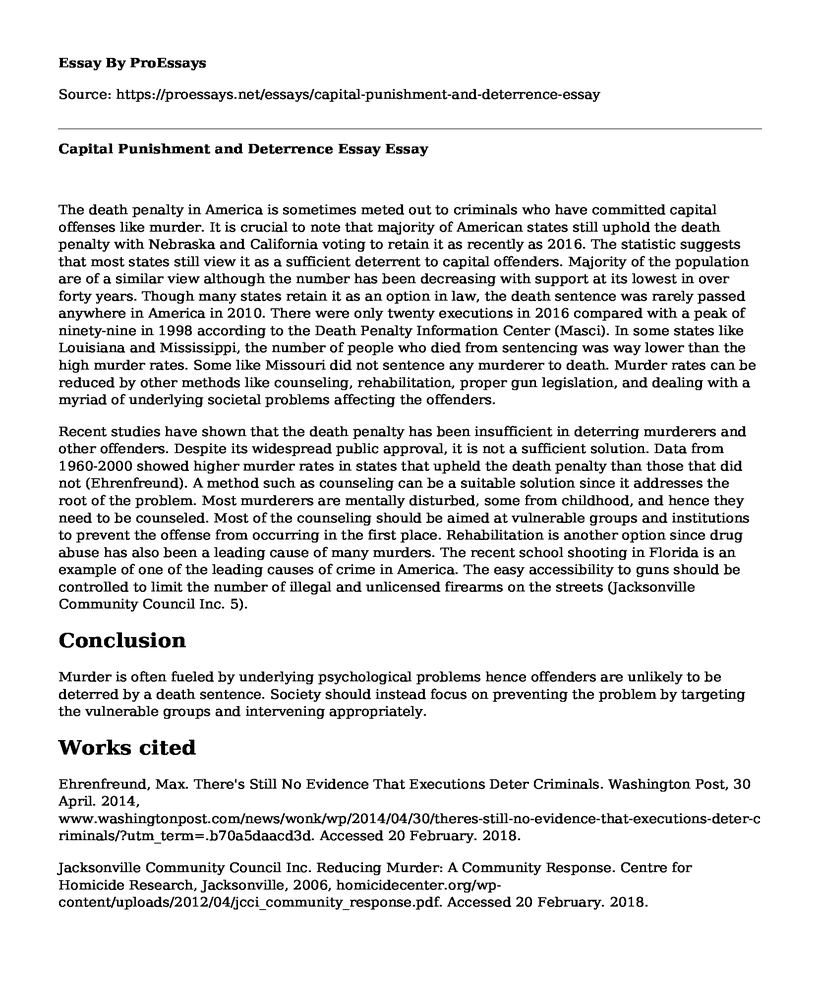The death penalty in America is sometimes meted out to criminals who have committed capital offenses like murder. It is crucial to note that majority of American states still uphold the death penalty with Nebraska and California voting to retain it as recently as 2016. The statistic suggests that most states still view it as a sufficient deterrent to capital offenders. Majority of the population are of a similar view although the number has been decreasing with support at its lowest in over forty years. Though many states retain it as an option in law, the death sentence was rarely passed anywhere in America in 2010. There were only twenty executions in 2016 compared with a peak of ninety-nine in 1998 according to the Death Penalty Information Center (Masci). In some states like Louisiana and Mississippi, the number of people who died from sentencing was way lower than the high murder rates. Some like Missouri did not sentence any murderer to death. Murder rates can be reduced by other methods like counseling, rehabilitation, proper gun legislation, and dealing with a myriad of underlying societal problems affecting the offenders.
Recent studies have shown that the death penalty has been insufficient in deterring murderers and other offenders. Despite its widespread public approval, it is not a sufficient solution. Data from 1960-2000 showed higher murder rates in states that upheld the death penalty than those that did not (Ehrenfreund). A method such as counseling can be a suitable solution since it addresses the root of the problem. Most murderers are mentally disturbed, some from childhood, and hence they need to be counseled. Most of the counseling should be aimed at vulnerable groups and institutions to prevent the offense from occurring in the first place. Rehabilitation is another option since drug abuse has also been a leading cause of many murders. The recent school shooting in Florida is an example of one of the leading causes of crime in America. The easy accessibility to guns should be controlled to limit the number of illegal and unlicensed firearms on the streets (Jacksonville Community Council Inc. 5).
Conclusion
Murder is often fueled by underlying psychological problems hence offenders are unlikely to be deterred by a death sentence. Society should instead focus on preventing the problem by targeting the vulnerable groups and intervening appropriately.
Works cited
Ehrenfreund, Max. There's Still No Evidence That Executions Deter Criminals. Washington Post, 30 April. 2014, www.washingtonpost.com/news/wonk/wp/2014/04/30/theres-still-no-evidence-that-executions-deter-criminals/?utm_term=.b70a5daacd3d. Accessed 20 February. 2018.
Jacksonville Community Council Inc. Reducing Murder: A Community Response. Centre for Homicide Research, Jacksonville, 2006, homicidecenter.org/wp-content/uploads/2012/04/jcci_community_response.pdf. Accessed 20 February. 2018.
Masci, David. 5 Facts about the Death Penalty. Pew Research Centre, 24 April. 2017, www.pewresearch.org/fact-tank/2017/04/24/5-facts-about-the-death-penalty/. Accessed 20 February. 2018.
Cite this page
Capital Punishment and Deterrence Essay. (2022, Jan 17). Retrieved from https://proessays.net/essays/capital-punishment-and-deterrence-essay
If you are the original author of this essay and no longer wish to have it published on the ProEssays website, please click below to request its removal:
- Pop Art Impact to Guns, Violence, Civil Rights and Political Reforms
- Improvements to the Correctional System Paper Example
- Essay Example on Obama Care in Texas: Potential Issues and Challenges
- Dr. King's Assassination: A Rift Widening Between White & Black Americans - Research Paper
- Essay Sample on Missing Indigenous Women in Canada: A National Crisis
- Two Women, One Journey: Adelina & Juana's Epic Search for Apa - Essay Sample
- Essay Example on Sixth Amendment: Right to Practical Assistance of Counsel in Criminal Prosecutions







